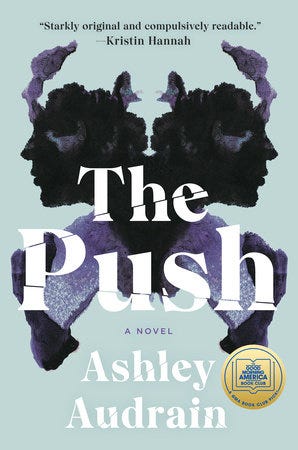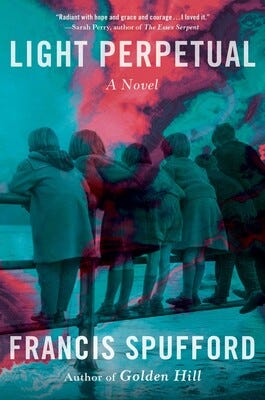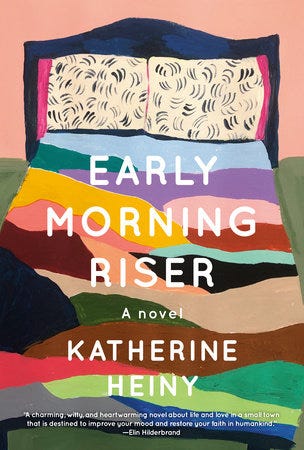July 2021 Reading Round-Up
The best and worst of my reading month
Welcome to the July 2021 Reading Round-Up. Each month, I write about the books I read and rank them from worst to best. A refresher on my rating system can be found here.
My reading month was filled with highs and lows. I read two books that I did not care for, but then read a book that was one of the best books I have read all year. I also got the chance to read a copy of Anthony Doerr’s latest book, Cloud Cuckoo Land, which will be released in late September. I was a massive fan of his 2015 Pulitzer Prize winner All the Light We Can Not See, and his newest does not disappoint. This month’s round-up also includes books on evangelical politics, the health of democracy around the world, mysteries, and historical fiction. Enjoy!
8. Arsenic and Adobo - Mia Manansala
Fiction/Mystery, 330 pages
Mia is an aspiring chef and restauranteur working in her Tita Rosie’s struggling restaurant in a small town outside of Chicago. When a harsh food critic (who happens to be Mia’s ex-boyfriend) drops dead in Mia’s family’s restaurant mid-meal, Mia becomes the prime suspect. After being released on bail, Mia decides to become an amateur detective and try to solve the murder and save the restaurant. At the end, the reveal of the true killer seemed to come out of nowhere, which may have been the goal, but I found it to be the mark of a book trying to do a bit too much. I was also extremely distracted by how Mia’s concern over saving the family restaurant completely superseded concern for her own fate, which I might add, would have involved the possibility of some very serious jail time. The best part of this book was the descriptions of food, the blending of cultures in the small Illinois town, and the recipes listed in the back of the book that I may try out if I can find some taro at the grocery store. The book is cute and easy, but certainly not anywhere near the best of its genre.
Rating: 6/10
7. The Push - Ashley Audrain
Fiction/Thriller, 320 pages
The Push is about Blythe, a young mother who believes that her daughter might be a sociopath. A terrible tragedy that occurs partway through the book further confirms her beliefs, despite everyone around her thinking that she is the one with the issues. Interspersed throughout the book are chapters about the troubled lives of Blythe’s mother and grandmother, which are meant to provide context for why Blythe is the way she is. I picked up this book because of the hype that I had seen surrounding what was advertised to be a unique plot and storyline. Frankly, however, I don’t think the hype was deserved. I kept waiting for the big twist, for something different to take place that I didn’t see coming, and it just did not happen. The implication that bad-mothering runs in a family was done poorly enough to be borderline insulting. All in all, Audrain’s creation of an unreliable narrator could have been exploited so much better, and instead I was left with a medium quality, quickly read thriller with a predictable ending.
Rating: 6/10
6. Jesus and John Wayne - Kristin Kobes du Mez
Non-Fiction/Politics/Evangelicalism, 304 pages
After the 2016 election, exit polls revealed the enormous block of evangelical voters who cast their ballots for Donald Trump. How, pundits asked, could a group of people who professed a faith based in morality and kindness vote for a man without any obvious religion and whose crudeness was a hallmark of his personality? Enter Kristin Kobes du Mez, a historian who researches the intersection of religion, gender, and politics in the United States, who has written a book that tries to answer this question and explain the conundrum. Kobes du Mez argues that the evangelical movement has been shaped by an extreme form of patriarchy that uses religion as a tool to reassert masculine authority. This has manifested itself in different ways depending on the era, but a theme that runs throughout the evangelical movement regardless of time is a religion less focused on Jesus, love, and kindness, and more on about asserting power and maintaining a sense of self (read: manhood) in a constantly evolving America. Kobes du Mez argues that cultural factors have not just shaped the evangelical movement, but rather are intertwined with its identity, beginning with the idealization of John Wayne as the embodiment of American white Christian manhood in the 1950s, through the Reagan era, and culminating with Trump. Along the way, “culture wars” have caught significant political issues in its crosshairs, all of which in some way or another threaten white, straight, male dominance, including abortion and gay rights.
I have mixed feelings about this book. It took me a long time to finish, in part because I did not find the writing particularly compelling. This is not to say that it is not well-written, but I find that I am more easily engaged with writing that has a narrative focus or highlights the lives of certain figures as a way to embody the themes of the history. Overall, however, the argument is compelling and I learned a lot about a religious movement and the ways its political beliefs are tied to cultural identity.
Rating: 8/10
5. Who Is Maud Dixon? - Alexandra Andrews
Fiction/Mystery, 320 pages
Florence Darrow is an aspiring writer stuck in a job as an editorial assistant at a mid-level publishing house. When she gets the opportunity to work for the internationally acclaimed author, Helen Wilcox, Florence jumps at the chance. Helen Wilcox works under the pseudonym Maud Dixon, and Florence is one of the only people who knows her identity. Florence quickly becomes infatuated with Helen’s lifestyle and begins to emulate her with the hopes that she too might someday be as successful. After a few weeks, Helen proposes a research trip to Morocco, and it is there that things start to unravel. About a week into their trip, Florence and Helen get into a car accident and when Florence wakes up in the hospital Helen is missing. Assuming that she has died, Florence decides to take on her identity and finish Helen’s second novel for her. I won’t include any spoilers, but taking on someone else’s identity is generally a recipe for disaster, and Florence begins to discover that there is more to Helen (and Maud) than meets the eye that may well be dangerous.
Rating: 8/10
4. Light Perpetual - Francis Spufford
Fiction, 336 Pages
Light Perpetual by Francis Spufford centers around a singular question: what if? In 1944 a German bomb was dropped on a department store in South London, killing nearly everyone inside, including a handful of children under the age of twelve. After learning about this bombing, something tragically common during the war, Spufford asks the all-consuming question: what if the bomb had not fallen on this particular department store at this particular time? From here comes the premise of his novel, in which Spufford gives life to five of the children and writes them into adolescence, adulthood, and old age. The trajectories of each of his characters are explored within the context of a changing country in the 20th century, and readers watch them live their lives mostly in parallel to one another: falling in love, making mistakes, and growing old.
I enjoyed Light Perpetual, not least because Spufford is a talented writer. I did enjoy the second half of the book better than the first when the characters are older and more mature. In their youth I felt at times that the characters were not fully formed, which in many ways may mirror the imperfect reality that Spufford was trying to create.
Rating: 8/10
Thank you to Scribner for the advance review copy of this book.
3. Cloud Cuckoo Land - Anthony Doerr
Fiction, 630 pages, release date September 28, 2021
Cloud Cuckoo Land is a book about societies on the brink of disaster. Linking each of these narratives is the ancient Greek story of Aethon, an Odysseus-like figure whose journey is told both in-between chapters as well as through the characters' narratives. Aethon's story, aptly titled Cloud Cuckoo Land, unites the individual disaster narratives by reminding readers about the passage of time and how the past is preserved and carried into the future.
Anna is an orphaned child living within Constantinople in the years leading up to the Ottoman Empire's siege of the city, which had previously been thought to be impenetrable. Omeir is a boy ripped from his home and conscripted to fight for the Sultan. As the army gathers outside of the city and a massive new cannon is aimed at the walls, residents are forced to reckon with the impending destruction of life as they know it. As the walls begin to crumble, Anna smuggles out a copy of Aethon's story as a monument to what once was using Omeir as an unlikely accomplice.
Zeno is a young boy growing up in Lakeport, Idaho who joins the army during the Korean War and quickly becomes a POW in a Chinese camp. While there he meets Rex, a fellow British POW and former classics instructor, who teaches Zeno Greek letters and translation to pass the time and keep one another sane. Many years later, Zeno uses these skills to translate the newly discovered papyrus containing Aethon's story, buried by Omeir nearly 500 years prior. When it is complete he and a group of children put on its production in the Lakeport library as a way to pass on the tale. On the last day of rehearsals, a young man named Seymour plants a bomb in the library hoping to send a message about the overdevelopment of the area, the destruction of wildlife, and the impending disasters wrought by climate change.
Finally, Konstance is a child living aboard Argos, a spaceship containing what readers are led to believe are some of the last humans in existence forced to flee a not-so-distant future version of earth that has been destroyed by climate change. Konstance passes her time exploring a digitized version of earth available to the ship's inhabitants, until a deadly contagion permeates the crew and she must use Aethon's story relayed to her by her father to recalibrate her perception of life and the future.
If this feels like a lot, it's because it is. However, Doerr is a masterful writer who is able to connect stories so seemingly removed from one another while simultaneously addressing larger themes about human resilience in the face of inevitable demise. I am usually not a big fan of books that address disaster and apocalypses so directly, but the varied ways that Doerr approaches the subject makes for a beautiful and haunting story.
Rating: 9/10
Thank you to Scribner for the advance review copy of this book.
2. After the Fall - Ben Rhodes
Non-Fiction, Democracy/Autocracy, 336 pages
Ben Rhodes was a senior national security advisor in the Obama White House. For eight years, Rhodes worked closely with Obama to shape foreign policy and national security decision making. Some of Rhodes’ notable achievements included the crafting of the Iran Nuclear Deal and his service as a lead negotiator to open relations with Cuba. Not only was Rhodes out of a job after Trump was elected, but his two signature accomplishments were reversed, leaving him searching for personal meaning and questioning America’s shifting direction.
After the Fall is his response: a type of follow-up to his memoir about his time in the White House. In his second book, Rhodes reckons with the spread of authoritarianism around the world and the role of the United States in this rise. The book is divided into four sections: the first focuses on the erosion of democratic norms in Viktor Orban’s Hungary; the second is about authoritarianism in Russia under Vladimir Putin; the third is about the Chinese government’s attempts to maintain power through the destruction of individual freedom; and the final section follows Rhodes’ personal development as well as America’s democratic struggles. One of the most striking scenes of the book comes near the end, when he retells his 9/11 experience of working the polls on the Brooklyn waterfront and watching as the two planes hit each tower, ultimately fueling his desire to work in government. In many ways it was America’s response to 9/11, Rhodes argues, that destroyed global confidence in the superpower status that the United States had previously occupied, and justified doubts that democracy is the best option for governance. Although Rhodes sometimes leans a bit too hard on metaphors, there is no denying that he is a very gifted writer; and able to translate weighty thoughts on important topics into readable, lyrical sentences.
Rating: 9/10
1. Early Morning Riser - Katherine Heiny
Fiction, 336 pages
This was easily one of the best books I have read all year. Early Morning Riser follows Jane, a young, second grade teacher who has recently moved to Boyne City, Michigan. Boyne City is a small town where everybody knows everybody. After she gets locked out of her house, Jane meets Duncan, a man known around town for how well he knows each of the city’s women. They quickly develop a relationship which readers watch develop over the course of two decades alongside the other residents of Boyne City. Midway through the first decade, however, their lives are altered by a catastrophic car crash that forces all of them, but especially Jane, to redefine family and what it means to love.
Early Morning Riser is one of those books where not a lot happens, and yet everything happens. While there is a plot that is extremely compelling and includes something consequential and life-changing, it feels almost secondary because of the extraordinary characters. I don’t think there is a single character, no matter how prominent, that is not a fully fleshed out human being with quirks and humor and flaws. I found myself laughing out loud at some descriptions, appreciating the way that Heiny effortless told a serious story in a heartwarming and humorous manner. Every word in this book was used to achieve something, and the result was a delightful story about compassion, patience, love, and life in a small town.
Rating: 10/10
If you like what I’ve written or want to see more reviews, recommendations, and round-ups about a wide range of novels, histories, and more, consider subscribing now by entering your email. It’s free and it’s about books. What’s not to like?
Want to see last month’s round up? You can find that here.








